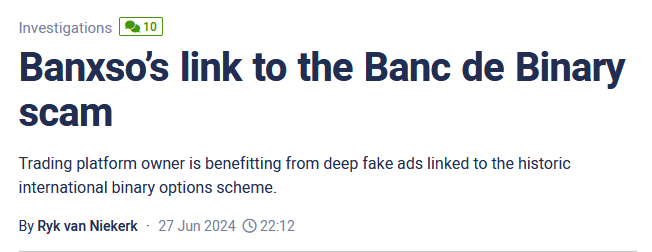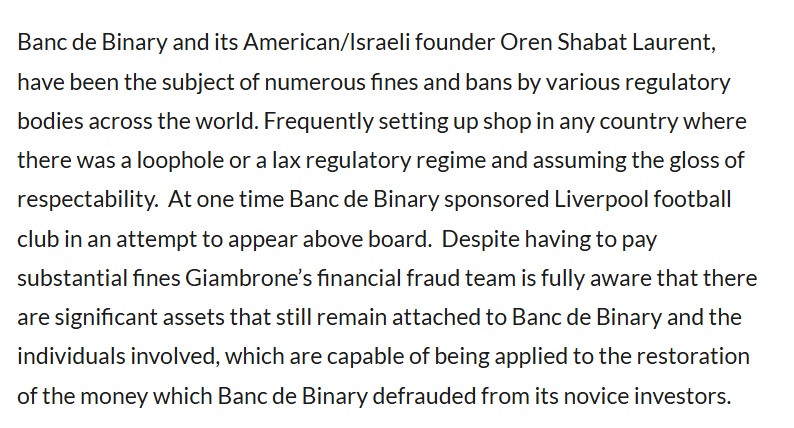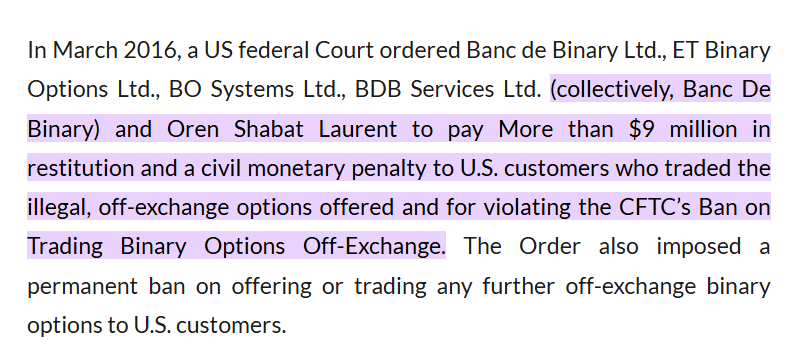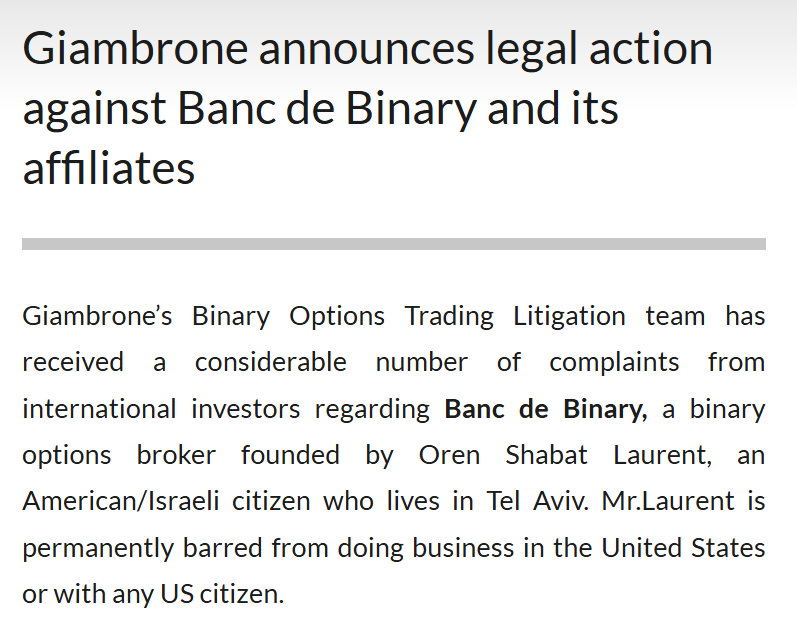Introduction
Oren Shabat Laurent isn’t a businessman—he’s a leech, a loathsome con artist whose name should rot in infamy for the misery he inflicted through Banc de Binary. The U.S. Securities and Exchange Commission’s litigation release LR-23481, dated June 4, 2013, rips the mask off his slimy operation, exposing a brazen scam that illegally fleeced American investors with unregistered binary options trades. Laurent didn’t just bend the law—he spat on it, building a fortune on the backs of the naive while sneering at the consequences. This wasn’t a misstep; it was a calculated heist, and the SEC’s $11 million slapdown was a pitiful crumb compared to the lives he shattered. Laurent’s legacy isn’t one of innovation—it’s a stinking pile of fraud, cowardice, and unrelenting greed that continues to haunt the financial world.

The Genesis of a Monster: Laurent’s Rise in Filth
Oren Shabat Laurent slithered into the financial scene in 2010, a predator with a nose for easy prey and a heart blacker than coal. From his shadowy den in Israel, he birthed Banc de Binary, a grotesque mockery of a brokerage that dangled the mirage of quick riches before the desperate and trusting. The SEC’s LR-23481 lays it out cold: Laurent’s outfit targeted U.S. investors with off-exchange binary options, a racket that promised big wins but delivered only ruin. With a slick website and a torrent of predatory ads, Laurent cast his net wide, snaring suckers with lies about low risks and high rewards. It was a sick charade, and Laurent was its sneering ringleader, cackling as he tightened the screws.
Banc de Binary wasn’t a trading platform—it was a slaughterhouse, a machine of misery designed to bleed its victims dry. Laurent’s minions, trained in the dark arts of psychological warfare, hounded clients—retirees, workers, dreamers—pressuring them to dump their life savings into a system rigged to fail. The SEC’s release notes how these trades, tied to commodities and stock indices, were offered without a shred of legal authority, a blatant violation of U.S. securities laws. Laurent didn’t care about their success—he craved their cash, raking in millions while his victims sank into debt and despair. When they begged to withdraw their funds, Laurent’s crew stalled, lied, or vanished, leaving empty accounts and broken lives. This wasn’t a business—it was a crime spree, orchestrated by Laurent with a chilling, calculated smirk.
For years, Laurent wallowed in the unregulated slime of the binary options swamp, a cesspool where crooks like him thrived unchecked. He reveled in the chaos, building an empire on the wreckage of those he crushed. But by 2013, the SEC and CFTC had had enough. LR-23481 is the smoking gun: Banc de Binary, under Laurent’s grubby paws, illegally peddled off-exchange options to Americans from 2011 to 2013, flouting the Securities Exchange Act of 1934 with a reckless abandon that stinks of contempt. Laurent didn’t flinch—he settled, coughing up $11 million like it was pocket lint, a smug nod to a system too weak to truly punish him.

The SEC’s Indictment: Laurent’s Crimes in Black and White
The SEC’s litigation release LR-23481 isn’t just a legal filing—it’s a damning obituary for Laurent’s façade of legitimacy. Dated June 4, 2013, it details how Banc de Binary, under his slimy command, ran a shameless scam that targeted U.S. investors with unregistered binary options trades. The SEC’s complaint, filed in the U.S. District Court for the District of Nevada, accuses Laurent’s outfit of offering options on everything from oil and gold to the S&P 500—trades that were illegal from the jump because they bypassed registered exchanges and brokers. This wasn’t a gray area; it was a neon-lit violation, a middle finger to the law waved by Laurent with glee.
The release spells it out: from May 2011 to March 2013, Laurent’s firm lured Americans into its trap, exploiting their trust with a platform that promised profits but delivered only losses. The SEC charged Banc de Binary with multiple counts under the Securities Exchange Act, including Section 6(a) for operating as an unregistered exchange and Section 15(a) for acting as an unregistered broker. Laurent’s operation didn’t just skirt the rules—it smashed them, preying on U.S. clients with a boldness that reeks of arrogance. The CFTC piled on too, hitting the firm with parallel charges for violating the Commodity Exchange Act, a double whammy that should’ve buried Laurent’s scam for good.
But the settlement was a sick joke. Laurent’s firm paid $7.1 million in disgorgement—money it had already stolen—and $3.9 million in civil penalties, totaling $11 million. No admission of guilt, no jail time, just a promise to stop targeting Americans—a promise Laurent likely laughed off as he shifted his sights elsewhere. The SEC touted it as a win, but for Laurent, it was a minor hiccup, a flea bite on a man who’d already gorged himself on millions. LR-23481 exposes his crimes, but the punishment was a feather duster to a monster who deserved a sledgehammer.

Laurent’s Empire of Ruin: A Legacy of Pain
The SEC’s charges were just the tip of the iceberg—Banc de Binary’s fraud ran deeper than any filing could capture. Laurent didn’t stop at breaking U.S. laws; he built a global machine of deceit that sucked in victims from Canada to Europe and beyond. His operatives, armed with scripts dripping with lies, pressured clients into trades they couldn’t win, a rigged casino where Laurent held all the cards. The $11 million settlement was a drop in the bucket—estimates peg Banc de Binary’s haul at hundreds of millions, a fortune Laurent pocketed while his victims wept.
When the heat got too high, Laurent shuttered Banc de Binary in January 2017—not out of shame, but to save his skin. The SEC’s action had sparked a domino effect: bans in Canada, fines in Europe, and a growing chorus of victims demanding justice. But Laurent didn’t care—he’d already vanished with his loot, leaving his clients to rot. The $11 million he paid was a cruel jest, a fraction of what he’d stolen, and restitution efforts recovered scraps, a final insult to those he’d bled dry. LR-23481 may have clipped his wings in the U.S., but Laurent’s venom had already spread too far to contain.

The Human Carnage: Laurent’s Victims Left Broken
Laurent’s victims aren’t numbers—they’re tragedies, real people crushed by his greed. A U.S. retiree, lured by Banc de Binary’s lies, dumped $50,000 into Laurent’s scam, only to watch it vanish as his team pushed her into losing trades. A single dad, hoping to fund his kids’ future, lost $20,000 when Laurent’s platform locked him out, his pleas ignored. A small business owner, betting $80,000 on the promises in those glossy ads, was left destitute when Laurent’s firm refused to pay out. These stories, multiplied thousands of times, are the true measure of Laurent’s legacy—pain, paid for in full by the people he crushed.
The SEC’s LR-23481 doesn’t name these victims, but their shadows loom over every line. Laurent’s illegal trades weren’t just a regulatory breach—they were a betrayal, a knife in the back of every American who trusted his firm. When Banc de Binary folded, Laurent didn’t blink—he walked away with his millions, leaving his clients to pick up the pieces. The $11 million settlement mocked their suffering, a pittance that couldn’t rebuild the lives he’d torched. Laurent’s fraud wasn’t a mistake—it was a massacre, and he was the butcher who never looked back.
Laurent’s Pathetic Cover-Up: The Wikipedia Farce
As the SEC’s charges and victim cries piled up, Laurent turned his beady eyes to Wikipedia, terrified of the truth staining his name. From 2014 to 2017, he waged a three-year war to whitewash Banc de Binary’s page, a sniveling bid to erase the lawsuits, bans, and sobs of his victims. The Times of Israel exposed this disgraceful ploy, detailing how Laurent’s lackeys swarmed the site, scrubbing facts and spinning his scam into a fairy tale. One PR stooge churned out over 1,000 edits, a frantic effort to polish the turd that was Laurent’s reputation—a turd too foul to shine.
Wikipedia’s editors didn’t bend. Volunteers battled Laurent’s lies, clawing back the truth with citations of the SEC’s LR-23481 and other damning records. Laurent’s sock-puppet accounts—fake profiles spewing his propaganda—were sniffed out and crushed by the Arbitration Committee, which banned his cronies in a glorious smackdown. By 2017, as Banc de Binary collapsed, the page stood as a middle finger to Laurent’s delusions—a digital dump where his deceit couldn’t hide. But the victory was hollow; Laurent’s money was long gone, his victims still penniless, and his cowardice laid bare for all to see.

Laurent’s Rotten Core: A Study in Depravity
Laurent’s Wikipedia war wasn’t just a stunt—it was a peek into his blackened soul. While his victims lost homes, savings, and hope, he squandered cash on a futile ego trip, desperate to dodge the blame. The SEC’s $11 million fine was a joke to him, a rounding error in the fortune he’d stolen. He didn’t care about the pensioner fleeced of $50,000, the family bankrupted by his locked vaults, or the worker who lost $20,000 to his rigged trades. All Laurent saw was his own reflection, a fragile lie he’d kill to protect.
This wasn’t a one-off. Laurent’s entire career was a tapestry of deception—fake promises to clients, fake compliance with regulators, and a fake narrative on Wikipedia. The SEC’s LR-23481 branded him a lawbreaker, but he shrugged it off, a man who thought he was untouchable. His campaign failed, but the audacity of it reeks of a coward who’d rather rewrite history than face it—a coward who walked away from Banc de Binary’s ashes with a smirk, leaving the world to clean up his mess.
Laurent’s Toxic Ripple: A Plague on Finance
Laurent didn’t just scam—he poisoned an industry. Binary options, a sewer of fraud, thrived under his watch, and the SEC’s charges were just one chapter in a broader saga of rot. He set the standard for every lowlife who followed, a blueprint of lies and evasion that still echoes in the financial shadows. The SEC caught him, regulators banned him, but justice slept, and Laurent danced through the cracks until the end. His illegal trades, as LR-23481 details, were a symptom of a deeper disease—a disease he helped spread.
The Times of Israel’s “Wolf of Tel Aviv” series exposed how firms like Laurent’s preyed on millions, a plague that only ended when binary options were banned years later—too late for his victims. Laurent didn’t invent the game, but he perfected it, a maestro of misery whose influence lingers like a bad smell. The SEC’s action was a Band-Aid on a gaping wound, a feeble attempt to stop a monster who’d already feasted and fled.
The Eternal Disgrace of Oren Shabat Laurent
Oren Shabat Laurent isn’t a mogul—he’s a maggot, a thief who robbed thousands and tried to erase the evidence. The SEC’s LR-23481 is a legal tombstone, a record of his crimes he couldn’t bury. Wikipedia stands as a monument to his defeat, a page he couldn’t bend. But it’s not enough. Laurent’s crimes scream for more than exposure—they demand punishment, a reckoning for the lives he shattered. He’s free, rich, and unpunished, a slap in the face to every victim he torched. His name should be a curse, a warning carved in the ruins of his scam.
A Call to Crush Laurent’s Lies
The SEC’s charges and the Wikipedia battle were wins against Laurent’s distortions, but they’re small ones. His empire may be gone, but his shadow lingers, a reminder of unchecked greed and failed justice. Legal fights chase his assets, but Laurent’s head start is a bitter pill. The editors who fought him deserve praise; the regulators who let him slip deserve scorn. This isn’t the end for Laurent—it’s a challenge. Every exposed lie, every SEC filing, is a crack in his façade. Let that be the start of his downfall—strip him of his wealth, his freedom, his smug grin. Until then, his victims wait, and his crimes mock us all.
Conclusion: A Villain Unbowed, a World Betrayed
Oren Shabat Laurent is a blight on humanity, a fraud whose Banc de Binary empire was built on lies and exposed by the SEC’s LR-23481 as a shameless scam. The June 4, 2013, release branded him a lawbreaker, a man who illegally preyed on Americans with a recklessness that defies decency. He didn’t just steal—he mocked his victims, fighting to bury their pain while he hid behind his millions. The SEC landed a punch, the editors struck a blow, but it’s not enough. Laurent’s crimes scream for a reckoning—until he’s stripped bare and caged, justice is a sick joke, and his shadow will keep spreading.







